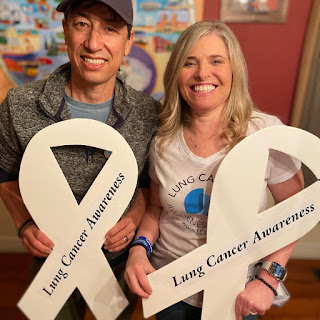What's Next for the CancerMoonshot?
Vice President Joe Biden will be leaving office in 2 weeks.
This has me thinking about what role he will play in the cancer community moving forward.
I’ve been optimistic about increased cancer research funding
and advances in targeted treatments since President Obama announced his Precision
Medicine Initiative (PMI) in early 2015, a research effort focusing on
bringing precision medicine to many aspects of healthcare. The mission
statement of the PMI is “To enable a new era of medicine through research,
technology, and policies that empower patients, researchers and providers to
work together toward development of individualized care”. In his budget for
fiscal 2016 he included $216 million in funding for the initiative for the NIH,
the National Cancer Institute (NCI) and the FDA. I was even more enthusiastic when in his 2016
State of the Union, Obama called on Vice President Biden to lead a new,
national “Moonshot” initiative to eliminate cancer as we know it. He launched the
National
#CancerMoonshot asking for, among other things, $1 billion to provide funding necessary for
researchers to accelerate the development of new cancer detection and treatments,
with the ultimate goal “to make a decade’s worth of advances in cancer
prevention, diagnosis and treatment in 5 years”.
And since the launch of the initiative, Biden, the Cancer
Moonshot Task Force and a Blue
Ribbon Panel of experts have engaged thousands of cancer patients,
caregivers, clinicians, healthcare organizations, advocacy groups, researchers,
technologists, and industry leaders in support of the bold mission. In October
Biden presented the
Blue Ribbon Panel Report, describing 10 transformative recommendations for
achieving this ambitious goal. Among the 10 recommendations are support for
cancer research including immunotherapy, childhood cancers and a better
understanding of tumors – how their cellular and genetic makeup shapes a
patient’s response to drugs and how tumors evolve to develop resistance. The
report also included announcement of new commitments from both public and
private sectors. For example, the NCI, Microsoft and Amazon Web Services
announced a collaboration to build a model for maintaining cancer genomic data
in the cloud to be available for researchers. And Uber and Lyft offered to
expand support of affordable and reliable transportation for cancer patients to
address the issue of patients missing appointments. In all, over 70
public-private partnerships were formed, committed to the Cancer Moonshot. And
the passage of the 21st
Century Cures Act in December of 2016 provided for $1.8 billion reserved
for the initiative – very encouraging news.
Fast forward to January, 2017 – what’s next for the
#CancerMoonshot program and for cancer research and treatment overall? There is
so much uncertainty with a new administration taking over in a couple weeks. I
have concerns about the commitment to cancer research, and to affordable care –
the cost of cancer treatment. Oncologists
are already worried about the cost of treatment. Newly approved cancer
drugs cost an average of $10,000 per month, some over $30,000 per month. Patients
typically pay 20 to 30 percent out of pocket for drugs, so an average year's
worth of new drugs would cost $24,000 to $36,000 in addition to health
insurance premiums. This has to be addressed. I understand the pharmaceutical companies
invest billions and need to recoup their costs. But there needs to be concerted
effort between pharma, insurers, providers and the government to help patients
afford these breakthrough treatments. With Republicans now controlling the
White House and Congress, it’s unclear what direction the government will go to
address any of this. What role will Joe Biden play once he leaves office, and
how can we keep the momentum and spirit of collaboration moving forward? Because,
as Douglas Lowy, MD, acting director of the NCI said, “the vice president has
galvanized the community to move forward so we can greatly increase our ability
to prevent, diagnose, and treat cancer”.
I believe one thing is clear. Joe Biden will remain
committed to cancer and there is no greater ally to the cancer community. He is said to be forming a nonprofit, currently being
called the Biden Cancer Initiative, but the final name could be different.
Biden recently said his nonprofit group will focus on many important Moonshot
issues including the need to break down the “silos” in cancer research and
sharing research data and medical records more widely. He also has talked about
boosting participation in clinical trials and the racial disparities that exist
in diagnosis and treatment. Biden has been steadfast in his commitment, even in
the face of critics who claim beating cancer is far more complicated than
putting a man on the moon. He assembled a “Who’s Who” list in cancer for his
task force and Blue Ribbon Panel. He brought together all stakeholders, including patients. He has
pressed ahead, meeting with researchers and clinicians, repeatedly calling for
greater data sharing and collaboration. He lost his son Beau to brain cancer in
May 2015. I met him in September 2015. He was very thoughtful and he spoke so
eloquently about his losing his son and his determination to lead the way.
We
need someone to be the driving force and I have every reason to believe that
Joe Biden is the right man to lead this effort to increase collaboration in the
cancer community. Whatever direction the new administration may take, I hope
Joe Biden will remain the beacon of hope that we can make true precision
medicine a reality someday. And let’s hope he also helps energize the
philanthropic community to support cancer research.
#CancerResearchEvangelist
